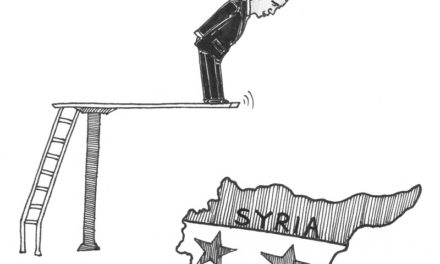With searing criticism still hounding President James Wagner, Emory officials are scrambling to mend various racial ills on campus.
The sense of urgency to bring some semblance of closure recalls a book written by Martin Luther King more than four decades ago. The book’s title raises a critical question: Where Do We Go From Here?
Included among the rumored ideas under consideration at Emory are the usual approaches: campus-wide sensitivity training and interracial discussion groups. Those are likely to be followed, of course, by reams of new reports, which may – or may not – be read or acted upon.
Anyone who has been here more than a decade, as I have, knows that particular drill by now. They also know that Emory’s approach to challenges regarding race relations is to treat it like rocket science.
Yes, Wagner penned an article praising a historic compromise among colonial white men and virtually dismissing the humanity of African Americans. And sure, many people rightfully remain astonished that the president of a premier university could do such a thing.
However, as an African American who encounters such thinking on a routine basis, one question is resounding in my head: As far as solutions to the school’s recurring racial fumbles, really, what’s the mystery here?
To put it bluntly, Wagner, though genuinely likeable and highly intelligent, is the product of a Eurocentric education. That educational model was built on the assumption of white supremacy. As Wagner’s misstep illustrated, the old school model still promotes white privilege. The distorted logic Wagner applied in the now infamous Emory Magazine article reinforced the myth that whites are the norm. By extension, other ethnic groups are mere aberrations.
So, really, where do we go when the university president harbors such educational blind spots?
Maybe I’m naïve, but I believe the solutions to some of Emory’s nagging racial difficulties require a little common sense, blended with the lessons that can be learned from history.
True history.
A point of disclosure: My take on this whole affair stems partly from my role as a lecturer in the African American Studies Department. I enjoy that role, but to be honest, I have always found one standing contradiction to be quite disturbing: On the one hand, all students in this country are required to complete American history courses at some point in their educational careers. On the other hand, African American history is considered distinct and optional learning.
Therein lies the problem, and, I might add, the potential solution.
The fact is, America would not be what it is today if it were not for the long, tortured institution of slavery. Despite all the boasting about our meritocracy, this country’s founders built its enormous wealth largely on the sweaty backs of blacks. In that sense, slavery is indispensible to the American story.
It is no secret that the Eurocentric versions often play down – or overlook – that vital piece of information. In that sense, students enjoy the privilege not to know. As a result, many students (and obviously administrators) arrive and leave Emory believing America is strictly a white creation.
Maybe that’s why we can count on some racial transgression surfacing on campus virtually every year. If not affirmative action resentments expressed on the Dooley Show, the offense comes from students donning blackface, or some fraternity flaunting a confederate flag.
There is always some racial insult to confront because, despite all the concentrated brainpower on campus, we have not figured out a way to counteract the blind spots inherent in the Eurocentric educational model.
Emory boasts a nationally acclaimed research library on black Americans. Still, most students likely go through their entire college careers and never once engage in a multicultural learning experience.
If we are to address the broader implications of Wagner’s mistake, we cannot rely solely on old approaches to stubborn racial problems. To truly unload this albatross, we must dare to be different moving forward.
Any solution must consider the weight of this single piece of logic: If racism was institutionally built into the fabric of our educational system over centuries, then it stands to reason that equally strong institutionalized efforts are required to weed it out.
Training and discussions are fine, but Emory needs to firmly commit to a progressive 21st century agenda. Which means we need to rethink the standards on what it means to be an educated person in an increasingly diverse nation.
Such considerations can only lead to a serious evaluation of racist structures, beginning with a genuine openness to curriculum change.
Certainly, such an agenda would not satisfy the need for immediate fixes to some racial problems. People rightly want to see signs of progress, and soon.
But over the long haul, the lack of a multicultural learning requirement is an educational gap we can no longer leave exposed.
Nathan McCall is a professor in the Department of African American Studies.
The Emory Wheel was founded in 1919 and is currently the only independent, student-run newspaper of Emory University. The Wheel publishes weekly on Wednesdays during the academic year, except during University holidays and scheduled publication intermissions.
The Wheel is financially and editorially independent from the University. All of its content is generated by the Wheel’s more than 100 student staff members and contributing writers, and its printing costs are covered by profits from self-generated advertising sales.







This sounds like a laudable and realistic goal. One thing, though. You write: “To put it bluntly, Wagner, though genuinely likeable and highly intelligent, is the product of a Eurocentric education.” This is true RE: his apparent biases broadly speaking, but I would note that he also is an engineer, and does not possess a humanities training or perspective, Eurocentric or otherwise. His lack of sensitivity in this regard is manifest in his statement, the abhorrent character of which people across the university together recognized. We need a multicultural requirement to be sure, but we also need a legitimate commitment to the humanities more broadly – both in the form of our President and in the form of support for humanities programs, not cuts to them.
I would be in favor of a multicultural education requirement. My undergraduate alma mater, Brandeis University, required all graduates to complete a course in “non-western and comparative studies.” From their FAQ on the gen-ed requirements: “Students must complete a one-semester course that examines a particular culture, society, or region of the non-Western world, or that systematically makes comparisons across cultural barriers. The requirement aims to enlarge students’ understanding of human achievements and potential beyond the Western tradition.” I took a course on East Asian history; it was eye-opening both in terms of the actual historic facts that we discussed and in that it made me reflect upon why I’d made it through all my previous years of education without ever learning any of them before.
If we institute a multicultural education requirement can we make Wagner take one of the classes?
Only if the credits transfer to his next place of employment.
Ha, ha! This guy called President Wagner a white supremacist!
The idea that slavery was entirely, or even mostly responsible for the “wealth” of nations is, to me, an oversimplification of history — it was one aspect into a patchwork of several other forces, which would have continued to exist with or without it. In fact, citizens of these nations may have been much more mutually successful had slave tasks been accomplished by empowered paid craftsmen.
But everything else is right.
Flying the confederate flag is not racist. The civil war was not fought over slavery. Lincoln didn’t even plan to abolish slavery before the war began. The flag is a symbol of the South and all those who died in a legitimate resistance to Union aggression and imperialism. Slavery didn’t start under the Confederacy.
“Freedom,” do you go to Emory? Because I really think it would be great if you were to fly your flag proudly, perhaps in front of Jim Wagner at a public event in a gesture of support for him. You could also perhaps have some signage explaining your thoughts on “Union aggression and imperialism.” Maybe you could attend tomorrow’s faculty meeting, it’s in White Hall at 4PM! I’m sure both the voting faculty and Jim Wagner himself would love your support. Or do you already work in the administration?
Of course, McCall’s solution is for the school to give his dept. more money and resources. Maybe a raise for it’s professors too, perhaps?
President Wagner has consistently seen his salary increase, well over the rate of inflation for the past decade, and he has received numerous bonuses while demanding that faculty “give back” from their salaries to support their own departments. Meanwhile, Af-Am has been repeatedly denied funding for a graduate program. What’s wrong with this picture?
Wagner is the devil. He is worse than Wall Street. That is old news.
Such a nonwestern historical/cultural requirement already existed in the 2005 GERs.
Requirement V, Section C: http://catalog.college.emory.edu/2010/08/academic/general_education/ger/fall2005/index.html
Mr. Giffin, I don’t know who drives me more crazy; You or the Kazakstan boy. Stop taking these arguments so seriously. You are over thinking everything. That girl who called you a white privilege just wanted to hook up with you. But instead, you take things seriously and write 50 articles about how you’re feelings were hurt. You can not change people’s fundamental values just like that Chick-fil-A CEO that you and Kazakstan boy love can’t make me stop being gay.
Hey Raoul,
I was merely trying to cite that old GER requirement as an example to further this discussion.
I didn’t realize that constituted “over thinking” something, unless you are referring to the other things I have written. If that is the case, I would suggest directing your comments to the appropriate pages and not filling space on this one venting at me over your personal grievances.
Thanks,
-David Giffin
Mr. Giffin, you are a character! I was referring to you citation and all of the other too serious things that you write. You did it again just in this last post; “I would suggest directing your comments to the appropriated pages and not filling space on this one…”. You are too obsessed with these imaginary rules. This isn’t the 1950s and nobody follows the rules anymore. You are going to have a heart attack if you keep making a big deal about everything. I wasn’t “venting at (you) over (my) personal grievances.” Just like those people in the white privilege article comments said, not everything is about you. All of this insecurity is a sign of weakness. If you let people know that they can get under your skin, they will take advantage of that. Stop being such a pandsy boy and have fun while you’re still young.